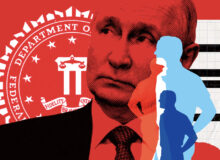By Quin Hillyer at The Washington Examiner, Oct. 11;
As I predicted in this space four times earlier this year, October has begun with the sort of serious stock-market instability that could portend another financial crisis.
The difference between a mere “major market correction” [or even a full bear market] and a true crisis is important, though. The latter scenario usually arises when the former situation causes panic. The key to riding this thing out will be to avoid that reaction. President Trump’s wild assertion Wednesday (about the nation’s central bank) that “ the Fed has gone crazy” is exactly the wrong message. It only feeds a damaging panicky psychology.

To be clear, the markets are falling — the worst NASDAQ start to a fourth quarter of a year since 2008 — for very good reason. Rapidly-climbing bond yields and higher labor costs threaten to tighten profit margins considerably in the coming months. Both China and the United States are starting to feel the negative effects of trade tensions. (The recent, tentative agreement to update NAFTA ameliorates the damage Trump’s trade-war talk had been doing, but the Wall Street Journal is right that it still would on balance do more to hurt than help the U.S. economy.) Inflation, while still lower than many (including me) predicted, is seen as approaching a full gallop, with some key supply companies recently announcing price hikes.
Hurricane Michael sent share prices of insurance companies downward. Added web-security costs for tech companies are among factors worrying that industry. Big-box retailers like Sears continue to suffer as sales shift to online suppliers, and home and auto sales have been slowing (or slightly falling) for other reasons.
And yes, market-driven interest rate hikes, which the Federal Reserve’s own rate hikes are partly reacting to, hit “developing markets” such as Latin America particularly hard, which in turn has ripple effects on our own economy.
The biggest problem, though, is that if investors start losing serious money in a cascading market sell-off, both the U.S. and international economic systems are not in position to finance more debt….
[The full column is here.]






